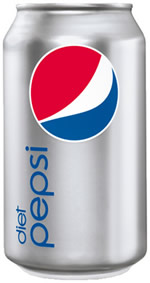Nowadays, a lot of people seem to search for healthier substitutes for the things they eat and drink. People are often experimenting with lower calorie, sugary drinks. Today, there is much debate over whether or not diet drinks really allow a person to enjoy their sugary drinks and foods without receiving the consequences of gaining weight. The question I instead ask is whether or not these chemicals that are used in these diet drinks and foods have an effect on the brain itself. The chemical I have decided to look at specifically is aspartame.
Aspartame is a substitute for sugar in which is low calorie and is the combination of the amino acids, aspartic acid and phenylalanine. It is the most popular and frequently used artificial sweetener in the United States currently. It is found in many diet soda drinks, gum, yogurt, and desserts. Aspartame is used because it is said to be two-hundred times sweeter than real sugar, meaning much less of it can be used to get the same sweet effect sugar produces in the drinks and foods we consume.

Aspartame acid is processed by the body differently than other acids because it is an unnatural structure. The amino acids in which aspartame is composed of tend to attack cells in the brain, causing a toxic cellular overstimulation that “excites” a person’s cells.
Dr. Russell Blaylock, a notable retired neurosurgeon states: “Excitotoxins have been found to dramatically promote cancer growth and metastasis. In fact, one aspartame researcher noticed that, when cancer cells were exposed to aspartame, they became more mobile … “
Here is a list of illnesses which in fact occur when there is long-term exposure to excitatory amino acid damage. This exposure could be due to excessive amounts of aspartame in a human’s system.
| Multiple sclerosis (MS) | ALS | Memory loss |
| Hormonal problems | Hearing loss | Epilepsy |
| Alzheimer’s disease and dementia | Parkinson’s disease | Hypoglycemia |
| AIDS | Brain lesions | Neuroendocrine disorders |
After coming across several studies, it has come to my attention that it is in fact the combination of aspartame-containing beverages with carbohydrate-rich foods that presents the most risk to the brain. Researchers began to experiment with rats and the effects of aspartame on them. Both the New England Journal of Medicine and the Environmental Health Perspectives discuss studies in which were performed on rats to analyze the effects of aspartame. The rats first consumed aspartame. Just from the consumption of aspartame, the phenylalanine in the rats’ brains doubled. This effect was then doubled if a rat then consumed a carbohydrate-rich food after consuming the aspartame. The Environmental Health Perspectives reported that the same effects occurred with the amount of phenylalanine in humans when they consumed aspartame in addition to a sufficient amount of carbohydrates.
What is bad about the increase in phenylalanine however? Excess amounts of phenylalanine can be harmful to the brain as it can decrease the production of brain hormones and serotonin (which acts as a neurotransmitter) by competing with the amino acids in aspartame. In addition, excess phenylalanine has the ability to inhibit enzymes that synthesize neurotransmitters. Neurotransmitters communicate much of the information from our brains to our bodies.
 There have not been many substantial studies in which have raised concern with the higher levels of phenylalanine due to aspartame on the human brain. There have been a few studies that have been performed on children and their cognitive development after they have ingested aspartame, but there have been no real surprising outcomes. The studies with the rats have caused researchers and scientists to keep an eye on the use of aspartame and the effects it may have. I suggest more studies be done as the results of too much phenylalanine are not good. Starting off with experimental studies on the rats is ethical I believe but more must be completed.
There have not been many substantial studies in which have raised concern with the higher levels of phenylalanine due to aspartame on the human brain. There have been a few studies that have been performed on children and their cognitive development after they have ingested aspartame, but there have been no real surprising outcomes. The studies with the rats have caused researchers and scientists to keep an eye on the use of aspartame and the effects it may have. I suggest more studies be done as the results of too much phenylalanine are not good. Starting off with experimental studies on the rats is ethical I believe but more must be completed.
In conclusion, the levels of phenylalanine are doubled when rats and humans consume aspartame. The levels of phenylalanine are doubled again for both humans and rats when they consume aspartame-contained drinks and carbohydrate-rich food together. More studies must be completed to really say how high the levels of phenylalanine must be to be dangerous, having detrimental effects on the brain. Researchers have not rejected the null hypothesis that aspartame has no dangerous effect on humans as of now. Research does not necessarily suggest people need to keep a watchful eye on the consumption of aspartame but it is better to be safe than sorry!
http://familydoctor.org/familydoctor/en/prevention-wellness/food-nutrition/sugar-and-substitutes/sugar-substitutes-what-you-need-to-know/aspartame-what-you-need-to-know.html
http://www.livestrong.com/article/389334-a-list-of-foods-containing-aspartame/)
http://articles.mercola.com/sites/articles/archive/2012/03/24/aspartame-affects-brain-health.aspx
http://www.nejm.org/doi/full/10.1056/NEJM198308183090710
http://www.ncbi.nlm.nih.gov/pmc/articles/PMC1474447/pdf/envhper00434-0053.pdf
http://www.caffeineinformer.com/wp-content/caffeine/diet-pepsi-cola.jpg
https://janinerbeaner.files.wordpress.com/2013/05/aspartame.png
http://i49.tinypic.com/16hrqf9.jpg


I have recently noticed on the Pepsi bottles around campus that they are no longer using aspartame in their diet Pepsi. I did not think anything of this until I read this post. It is a difficult decision to drink regular to diet soda, because people say that they are both bad for you, just in different ways. So, why not just give it up? But, soda is addictive as well as many other sugary drinks. But, I will definitely be more cautious after reading this post. I hope as the future progresses more studies are done on this topic, and people became more and more aware of what they are putting into their bodies.